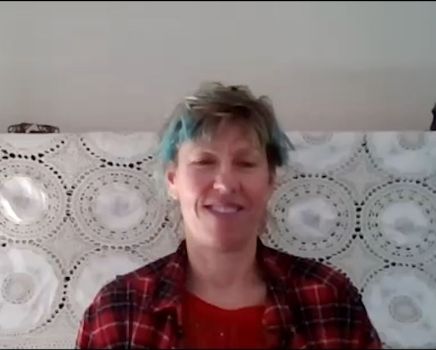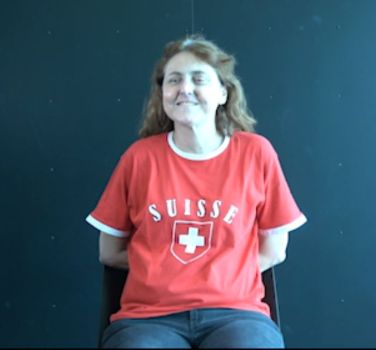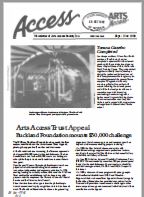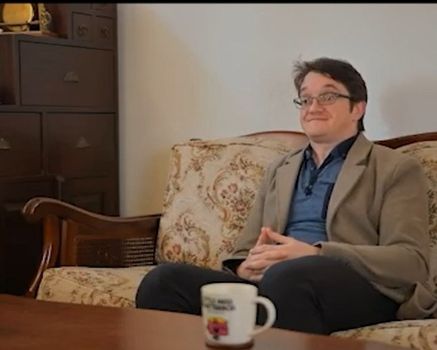Items
Search full-text
“Australia Council releases its first Disability Action Plan”
-
“The Commonwealth Disability Services Act of 1986 replace the Handicapped Persons Assistance Act of 1974” In 1983, The Hawke Labour Government evaluated the initiatives created under the Handicapped Persons Assistance Act of 1974. The HPAA was replaced in 1986 by the Commonwealth Disability Services Act of 1986. Among other changes, this Act represents the shift in nomenclature from 'handicap' to ‘disability’.
-
“Screen producer, editor, and accessibility consultant Stephanie Dower is interviewed for Screen Queensland On Air, in an episode called How They See Us: Disability in the Screen Industry” Stephanie Dower was interviewed in 2020 for Screen Queensland On Air, in an episode called How They See Us: Disability in the Screen Industry. Dower is an editor, producer, and writer for screen. She has also worked with Get Skilled Access and as an accessibility consultant for Queenslanders with Disability Network.
- Veronica Pardo
- Brigid Hanrahan
-
“Essay collection ‘Growing Up Disabled in Australia’ is published in 2021” In 2021, Carly Findlay edited a book ‘Growing Up Disabled in Australia,’ a collection of more than 40 Australian writers with disabilities sharing their lived experiences.
-
 "Interview with Emiko Artemis" Dr Emiko Artemis is a visual artist with a PhD and a history of both solo and group exhibitions. Interview Summary Emiko Artemis identifies as a non-binary queer disabled visual artist. Emiko acknowledges their work essentially reflects their personal experiences with disability and comments on society. Despite interpersonal challenges due to disabilities, Emiko cherishes occasional collaborations, facilitated by clear structures or supportive relationships. Their artwork, often seen as "weird" to the public, aims to be thought-provoking rather than being particularly political. Emiko values the growing visibility of disability in the arts and the increase in acceptance of diversity in society. They proudly embrace their own identity as an integral aspect of their creative practice
"Interview with Emiko Artemis" Dr Emiko Artemis is a visual artist with a PhD and a history of both solo and group exhibitions. Interview Summary Emiko Artemis identifies as a non-binary queer disabled visual artist. Emiko acknowledges their work essentially reflects their personal experiences with disability and comments on society. Despite interpersonal challenges due to disabilities, Emiko cherishes occasional collaborations, facilitated by clear structures or supportive relationships. Their artwork, often seen as "weird" to the public, aims to be thought-provoking rather than being particularly political. Emiko values the growing visibility of disability in the arts and the increase in acceptance of diversity in society. They proudly embrace their own identity as an integral aspect of their creative practice - Eyre Arts Action Inc
- Arts Action Inc
- Susan Maley
- Crippled Childrens Association of South Australia
- Weave Movement Theatre
-
 "High Beam Festival Program 2007" High Beam Festival Program 2007 reads "High Beam Global is bigger, bolder and brighter than ever before. An array of exciting artists will dazzle you with art across every medium and will challenge your every sense. This festival recognises that people with disabilities are artists in their own right and prominently includes them within the mainstream Fringe program for the first time."
"High Beam Festival Program 2007" High Beam Festival Program 2007 reads "High Beam Global is bigger, bolder and brighter than ever before. An array of exciting artists will dazzle you with art across every medium and will challenge your every sense. This festival recognises that people with disabilities are artists in their own right and prominently includes them within the mainstream Fringe program for the first time." - Jungle Phillips
-
 "Interview with Janelle Colquhoun" Janelle Colquhoun is an opera-jazz singer; corporate and community speaker; MC; producer; and writer. Interview Summary Janelle Colquhoun is a passionate and dedicated former opera singer, who in the interview speaks about, starting an entertainment agency to provide professional opportunities for artists with disabilities after losing her sight. She has produced over 1400 events, performed in a variety of concerts, and worked tirelessly to promote inclusivity in the arts, often by showcasing talented disabled artists to mainstream audiences. Janelle talks about how her work challenges the way people think about disability arts and inclusion, and strives to give equal performing opportunities by advocating for the recognition of artists with disabilities as professionals with the same quality of performance as any other artist.
"Interview with Janelle Colquhoun" Janelle Colquhoun is an opera-jazz singer; corporate and community speaker; MC; producer; and writer. Interview Summary Janelle Colquhoun is a passionate and dedicated former opera singer, who in the interview speaks about, starting an entertainment agency to provide professional opportunities for artists with disabilities after losing her sight. She has produced over 1400 events, performed in a variety of concerts, and worked tirelessly to promote inclusivity in the arts, often by showcasing talented disabled artists to mainstream audiences. Janelle talks about how her work challenges the way people think about disability arts and inclusion, and strives to give equal performing opportunities by advocating for the recognition of artists with disabilities as professionals with the same quality of performance as any other artist. -
“The Art of Difference Disability and Deaf Arts Festival takes place in 2009” The Art of Difference Disability and Deaf Arts Festival in 2009 featured visual, performing, literary and new media artists as a two-week international arts festival.
- Helen Connors
-
“The inaugural Undercover Artist Festival, a biennial, disability-led performing arts festival, is held in 2015” In 2015, the inaugural Undercover Artist Festival took place. The festival was founded by Access Arts in consultation with Access Arts participants and a group of artists with disability. The festival has consistently been directed by leaders who identify as experiencing disability.
- Wayne Marnell
- Timothy Williams
- Georgia Szmerling
- Anne Lynch
-
"Radha O'Meara, Laura Dunstan, Anna Debinski, Catherine Ryan (2023). Disability and Screen Work in Australia: Report for Industry 2023. In Disability and Screen Work in Australia: Report for Industry. Melbourne Disability Institute, University of Melbourne." Disability is a key vector of inequality in Australian society. The screen industry has the potential to create meaningful change, in our workplaces and working practices, for our colleagues and our audiences. We need to pay more attention to disability and take more action to include disabled people in our industry. Disability equity, inclusion and accessibility training tailored to the screen industry can make a significant impact. Consultation, innovation and funding can transform industrial structures to create a more inclusive and sustainable industry for all screen workers. We must normalise talking about and providing access requirements to support disabled workers. The findings of this research reflect the need to build greater understanding, transparency and accountability in order to fully include disabled workers in the Australian screen industry.
-
 “Arts Access Victoria - Arts Access Society Inc. - Access Newsletter Sep - Nov 1992” Arts Access Arts Access Society Access Newsletter Sep - Nov 1992 - Arts Access Trust Appeal, national DADAA State Committee formed, Arts Access 'freasurer, Isi Plack toured the United States, Artist to Artist Forum, 1992 Participants Forum, The Hidden Imagination is Australia's first statewide festival of Community arts projects, “Bedrooms & Other Places” exhibition, “Stormy Weather” exhibition, projects update, resource centre update, membership.
“Arts Access Victoria - Arts Access Society Inc. - Access Newsletter Sep - Nov 1992” Arts Access Arts Access Society Access Newsletter Sep - Nov 1992 - Arts Access Trust Appeal, national DADAA State Committee formed, Arts Access 'freasurer, Isi Plack toured the United States, Artist to Artist Forum, 1992 Participants Forum, The Hidden Imagination is Australia's first statewide festival of Community arts projects, “Bedrooms & Other Places” exhibition, “Stormy Weather” exhibition, projects update, resource centre update, membership. - Sim Luttin
-
 "Interview with Matthew Shilcock" Matthew Shilcock is a stage and film performer, dancer, director, choreographer, producer, project planner, manager, consultant and disability advocate. Interview Summary Matthew Shilcock, a contemporary dancer, lives with osteogenesis imperfecta, a condition that led him to discover dance as an affordable alternative to physiotherapy. His 12-year dance career has been shaped by working with both disabled and non-disabled artists, including elite companies and individual dancers, where he found a passion for the unique problem-solving and rewarding experiences that come with working with disabled dancers. As he transitions from performer to dance maker, Matthew's motivation has shifted from personal excitement and self-discovery to a focus on the next generation, aiming to pass on his unique experiences and methodologies. He acknowledges that while being on stage as a disabled artist can be inherently political, he values his authenticity and the impact of his work over the perceptions and labels placed upon disability in the arts.
"Interview with Matthew Shilcock" Matthew Shilcock is a stage and film performer, dancer, director, choreographer, producer, project planner, manager, consultant and disability advocate. Interview Summary Matthew Shilcock, a contemporary dancer, lives with osteogenesis imperfecta, a condition that led him to discover dance as an affordable alternative to physiotherapy. His 12-year dance career has been shaped by working with both disabled and non-disabled artists, including elite companies and individual dancers, where he found a passion for the unique problem-solving and rewarding experiences that come with working with disabled dancers. As he transitions from performer to dance maker, Matthew's motivation has shifted from personal excitement and self-discovery to a focus on the next generation, aiming to pass on his unique experiences and methodologies. He acknowledges that while being on stage as a disabled artist can be inherently political, he values his authenticity and the impact of his work over the perceptions and labels placed upon disability in the arts.
